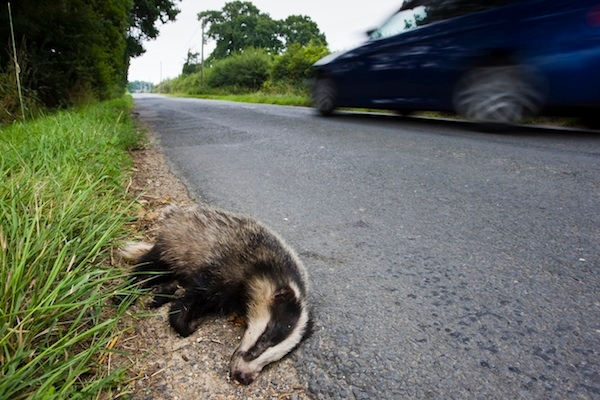I killed a badger the other day. I was driving at 40 at 6 a.m. on my way to hospital. I had been told I was first on their operations list. Two black lines divided by a white one dived at me from the dark and went under my left front wheel — bump! — and then almost instantly under the rear one — bump!
I glanced in the rearview mirror. Something badger-shaped lay still at the roadside. I thought about stopping, but by then I was into the roundabout leading onto the motorway. I thought of the badger, then the surgical team waiting for me. I drove on from the slip road into A3(M). Why does a badger have to choose this of all moments to commit hara-kiri under my car?
Is it really dead? Do I go back and check to make sure? No, a team of highly skilled surgeons, anaesthetists and theatre technicians are waiting for a 6.30 a.m. check-in.
Too late now. What are a badger’s rights set against those people after me on the operations list whose lives and health I would be disrupting by turning up late? What is the point of going back to check if it’s really dead? What’s the point of going back to find out if it is just alive? What can anyone do with a just-alive run-over badger but run over it again?
And how far should the rights of a half-dead badger interfere with the expertise of a hospital team dedicated to sustaining human life? And what right does a wild badger have over my rights to a longer life?
I’d been waiting for this operation for over a year and, blow it, a badger wasn’t going to come between me and my operation, certainly not a dead one.
But its death played on my mind. The surgical team, all wearing headbands and soft red tunics, manoeuvred me into the crouched position on the operating table, chin on chest, hands grasping my own elbows waiting for the anaesthetist’s needle.
They sought conservational subjects to soothe me — ‘Hi, I’m Kelly, I hear you’ve got a Jack Russell’ — said the anaesthetist. We talk of dogs, and another team member tells me about her cat and a book, unknown to me, telling the tale of an old neglected cat somewhere in Scotland that dies unloved. Do I see tears about to break?
And then I said: ‘I couldn’t help it, but I killed a badger on the way here.’ At least six faces register moods between the semi-shocked, the nonplussed and a mixture of condolences for me and horror for the badger. Insertions were made into my spinal nervous system, shocks forced my ankle to kick involuntarily. Someone, I think the cat lady, inserted a catheter into my private parts.
Nothing hurt but I slowly faded away into oblivion like a falling snowflake. Just after that the surgeon must have done his hacking, easing the blood flow in my left femoral artery.
I was only there for a day. The artery he had attacked didn’t hurt at all at first as, leg frozen, I was wheeled off into a recovery ward that resembled an airport apron with patients parked like Boeing 747s awaiting their next mission. More people in red nursed me back into the world of feeling.
When my wound began to sting it was not especially painful. Painkillers kept the worst at bay. Every two hours someone came and inspected it. Only the discomfort of the catheter grew.
The next morning I was given permission to get out of bed. Two physiotherapists assessed my walking and whether I could be trusted back in the real world.
At last a nurse called Liz came to remove my catheter. ‘Ooh,’ said Liz, ‘hasn’t this gone in a long way? Oh dear, I’ve never seen one in this far before.’ I glance down. At least eight inches of catheter is coming out and there’s still more to come. ‘Must have been right up in your bladder,’ said Liz. ‘It does hurt,’ I said. It did, too. And didn’t my first pee sting like mad?
No, I refuse to think anything but good of the surgical team. But if I have any cautionary advice to my fellow men, it is never to mention to someone who’s just about to insert a catheter into your penis — one who might shed tears over a dead cat 400 miles away in Scotland — that you’ve just killed a badger on the road and didn’t stop.






Comments